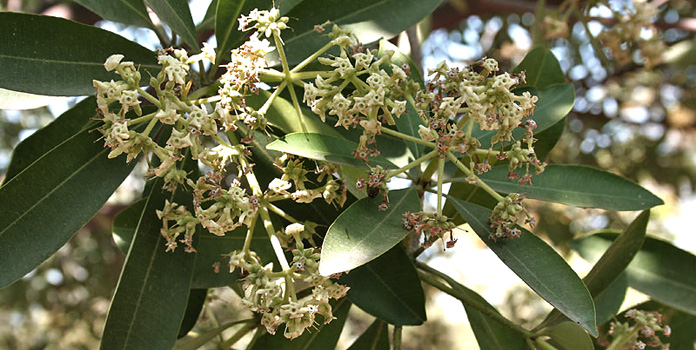Herbs A-B
Herbs C-D
Herbs E-M
Indian Name: Satvin tree
Botanical Name: Alstonia Scholaris
Other Names: Dita bark, Vishamacchada, Devil tree
Introduction
Synonyms used for Alstonia Scholaris are Saitankajat or Chattiyan in Hindi and Sarada, Saptaparna, Suktiparna, Sapthachada, Chatraparna, and Visalatvak in Sanskrit. It is an evergreen tree and tropical climate suits it well. It is known commonly as Pulai, Indian Devil Tree, White Cheesewood, Ditabark And Milkwood Pine. EzhilamPaala is the term used for it in Malayalam a language in southern India, meaning the Paala tree that has 7 leaves.
Origin
In many of the subtropical and tropical climates the tree grows naturally. Scholaris is native to the South East Asia and the Indian Subcontinent regions. It is also native to Australia and China. Flowers, fruit and leaves of the tree are used as medicine in India. The tree is grows up to 40 m and hence is a glabrous small tree.
It has copiously lenticellate branchlets and a grey colored bark. Leaves on the upper side have a glossy appearance while they are grey underneath. In the month of October the fragrant flowers start blooming. Cilated margins are present in the seeds in oblong shape and have tufts of hair. Bark of the tree is bitter, has milky sap and has no odor.

Uses
The evergreen tree with flowers in funnel shape and milky sap is used mainly for the purpose of making medicine. Asthma, malaria, conditions of the skin, malaria and epilepsy are treated with Alstonia Scholaris extract. This is an astringent medicinal herb used in Ayurveda to also treat chronic dysentery, snake bites, diarrhoea, and Panchkarma purification process. Ulcers are best treated with the milky sap of the tree.
Echitamine, alkaloids, echitenine and ditamine is contained in the bark which serves a great quinine alternative. Malaria and diarrhoea was treated with the bark’s decoction at one time besides as a vulnerary tonic, anticholeric, febrifuge and emmenagogue. To treat beriberi a decoction of the leaves is used. It is recommended to treat complaints of the bowels in Ayurveda. Wood of the tree is light and hence used in the making of coffins in Sri Lanka. Net floats, trenchers, utensils, cork are made from the wood which is closer to the root of the tree, in Borneo. Extracts obtained from it are known to possess activity of cytotoxic nature.
Statements on this website is collected from online and offline references, they are an effective way of learning and sharing. With this knowledge, we can take control of our own health. These statements have not been evaluated by the FDA. Products and techniques mentioned here are not intended to diagnose, treat, cure or prevent any disease. However, when you give the body what it needs then the body can heal itself as God intended it to. We are bulk suppliers/Exporters of herbs, and raw materials this website is intend to provide option for various herbs buyers/importers/our customers, buy small Qty swiftly and pay for the product and shipping.